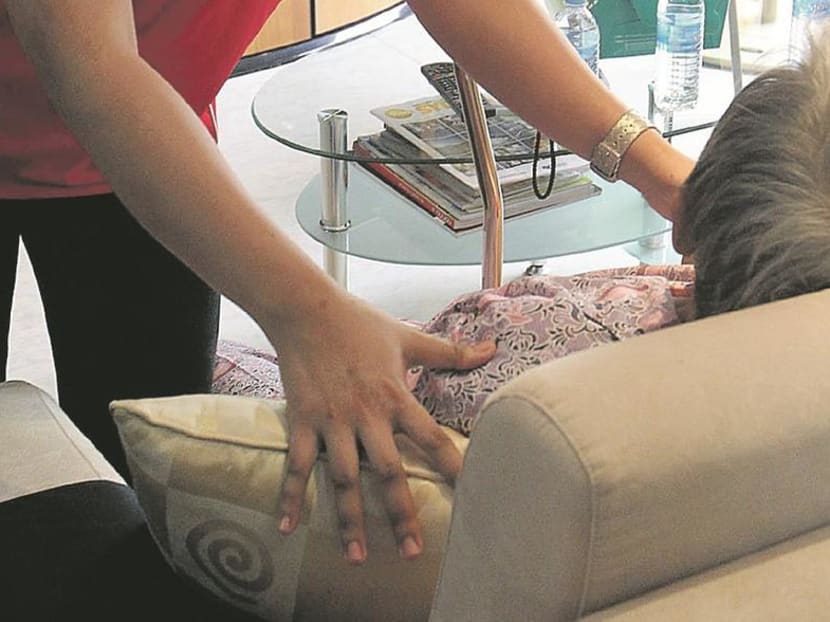Budget 2021 debate: MPs shine spotlight on challenges faced by caregivers, call for more emotional, financial support
SINGAPORE — The struggles of women who bear most of the burden of caregiving in Singapore were a recurring theme during the Budget debate on Thursday (Feb 25). And several Members of Parliament (MPs) gave suggestions on how the Government can offer better financial or emotional support to them.

Caregivers experiencing burnout and struggling with mental and physical health problems were some of the issues heard in Parliament on Feb 25, 2021.
- Five of the 27 MPs who spoke during the Budget debate touched on challenges faced by caregivers
- They raised issues such as retirement adequacy and caregiver burnout
- One proposal is to offer career guidance for caregivers who want to return to work
- Ms Sun Xueling from the Ministry of Social and Family Development said it is stepping up help for caregivers
SINGAPORE — The struggles of women who bear most of the burden of caregiving in Singapore were a recurring theme during the Budget debate on Thursday (Feb 25). And several Members of Parliament (MPs) gave suggestions on how the Government can offer better financial or emotional support to them.
Five of the 27 MPs and political office-holders who debated the Budget on Thursday touched on how caregivers here often experience burnout, and struggle with mental and physical health issues due to the stress incurred from their responsibilities.
They also pointed out that because most caregivers are women who have left their jobs in order to tend to older family members or sick parents, or young children, many of them are also left without enough savings for their retirement.
Earlier this month, Ms Carrie Tan, MP for Nee Soon Group Representation Constituency (GRC), had raised this issue in Parliament and asked if the Ministry of Manpower would consider introducing a new financial scheme for full-time caregivers to supplement their income and retirement savings.
To address these challenges, the MPs who spoke on Thursday offered various proposals such as connecting caregivers to part-time service jobs near their homes, providing career counselling and guidance for caregivers who want to return to the workforce, and a booklet to track mothers’ physical and emotional development.
IMPROVING RETIREMENT ADEQUACY
To help ensure that caregivers are able to return to the workforce to secure sufficient retirement adequacy, Tanjong Pagar GRC MP Joan Pereira suggested that the Government provides career counselling and training for these women who want to go back to work, be it on a full-time or part-time basis.
East Coast GRC MP Cheryl Chan proposed tapping community-based resources to provide more accessible opportunities for women to take on part-time work.
These platforms may help to connect women to those part-time service jobs near their homes, which can “enable essential workers, especially low-income families or single mothers to balance family care duties and supplement their income with work in the community”, she said.
Separately, Ms Ng Ling Ling, MP for Ang Mo Kio GRC, asked if the Government would consider expanding the new Alliance for Action for caregivers who look after people with disabilities, so that it covers all female caregivers.
“This is given that (female caregivers) are likely to be the majority (of all caregivers), and also... to cover those who are caring for seniors with acquired disabilities or health issues,” she said.
The Alliance for Action groupings consist of stakeholders from different sectors who will work together to push for improvements in work-life harmony and access to technology, among other matters.
The initiative was announced by Deputy Prime Minister Heng Swee Keat during a national broadcast addressing the Covid-19 crisis in Singapore last June.
SUPPORT FOR MOTHERS
Marsiling-Yew Tee GRC MP Hany Soh singled out new mothers as a group of caregivers whose mental and emotional needs are often neglected.
When a couple is expecting, she said, people around them have a tendency to show concern for the health of the newborn baby, and forget that the mother’s well-being needs to be taken care of, too.
“In order to ensure a healthy, nurturing environment for the baby, I believe that it is important to take equal care of the mother as well.”
Ms Soh proposed that the Government develop a booklet that tracks an expectant mother’s physical and emotional development, which she called the “Mummy’s milestone booklet”.
Noting that Taiwan has its own version of the handbook, she said that the booklet may contain important information by health practitioners on the preparations that mothers should make at each stage of pregnancy and parenting best practices, as well as a list of all the avenues of support available to parents for the first few years into parenthood.
Ms Cheng Li Hui, MP for Tampines GRC, called on the Government to rethink its policy on voluntary egg freezing and allow healthy women to store their eggs until they are ready to have children.
The procedure is illegal here, and only women with specific medical conditions — such as those undergoing cancer treatment — are allowed to freeze their eggs for future use.
Noting that many women are going overseas to get the procedure done, Ms Cheng made an appeal for the authorities to introduce proper legislative frameworks and make it legal here.
HELP IS AVAILABLE
Giving some details on the support for caregivers, Ms Sun Xueling, Minister of State for Social and Family Development, said that the Government has introduced new schemes to alleviate the burden of caregiving on women.
For example, it is investing more in the early childhood sector, increasing its annual spending to more than S$2 billion a year within the next few years.
The Government has also expanded preschool capacity and are on track to reach 200,000 places by 2023.
In this year’s Budget, the Government has said that it will be stepping up efforts to better support young children with developmental needs.
One area where this will be done is through the introduction of a new Inclusive Support Programme to provide children who require medium levels of early intervention support with in-school help.
The programme will be launched in a few selected preschools, with plans to expand it if it proves to be successful.
“(This can) lighten the load for mothers who care for children with developmental needs,” Ms Sun said.











